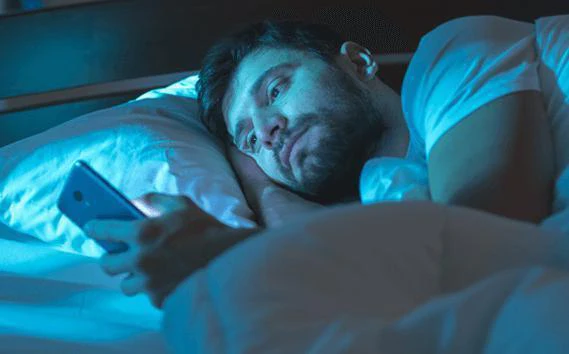In today’s digital age, we are constantly surrounded by screens emitting blue light from our smartphones, tablets, computers, and televisions.
While blue light has many benefits, it can also have a significant impact on our sleep quality. Understanding the effects of blue light on sleep and how to minimize its effects can help you get a better night’s rest and improve your overall well-being.
What is Blue Light?
Blue light is a high-energy, short-wavelength light that is emitted by the sun, as well as by electronic devices such as smartphones, tablets, computers, and LED lights.
While exposure to natural blue light during the day can have several benefits, such as boosting alertness and improving mood, exposure to artificial blue light at night can disrupt your sleep-wake cycle and interfere with your ability to fall asleep.
How Blue Light Affects Sleep
Exposure to blue light, especially in the evening and at night, can interfere with your body’s natural sleep-wake cycle, also known as the circadian rhythm.
Blue light suppresses the production of melatonin, a hormone that regulates sleep, making it harder to fall asleep and stay asleep. This can lead to sleep disturbances, reduced sleep quality, and daytime drowsiness.
Tips for Minimizing the Effects of Blue Light on Sleep
While it may be difficult to completely avoid blue light, especially in today’s digital world, there are several steps you can take to minimize its effects on your sleep:
1. Limit Screen Time Before Bed:
- Avoid using electronic devices such as smartphones, tablets, and computers for at least an hour before bedtime.
- If you must use electronic devices before bed, use a blue light filter or enable the “night mode” feature to reduce the amount of blue light emitted.
2. Use Blue Light Filters:
- Consider using blue light filters or apps that reduce the amount of blue light emitted by your electronic devices.
- Many smartphones, tablets, and computers have built-in blue light filter settings that you can enable to reduce blue light exposure.
3. Invest in Blue Light Blocking Glasses:
- Blue light blocking glasses are designed to filter out blue light and can be worn in the evening to reduce the impact of blue light on your sleep.
- Wear blue light blocking glasses for at least an hour before bedtime to help signal to your body that it’s time to wind down and prepare for sleep.
4. Limit Exposure to Blue Light at Night:
- Use dim, red- or amber-colored lights in the evening, as these are less likely to suppress melatonin production and interfere with your sleep.
- Consider using blackout curtains or blinds to block out outdoor light sources that may disrupt your sleep.
Conclusion
Blue light exposure, especially in the evening and at night, can have a significant impact on your sleep quality and overall well-being.
By minimizing your exposure to blue light before bedtime and taking steps to reduce its effects, such as using blue light filters, wearing blue light blocking glasses, and using dim, warm-colored lights in the evening, you can improve your sleep quality and wake up feeling more rested and rejuvenated.
So prioritize your sleep health, and take steps to minimize the impact of blue light on your sleep for better overall health and well-being.

Leave feedback about this